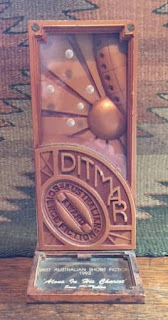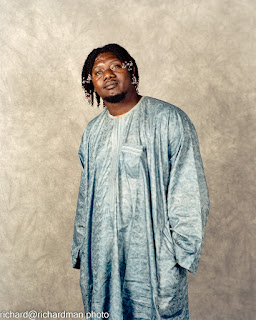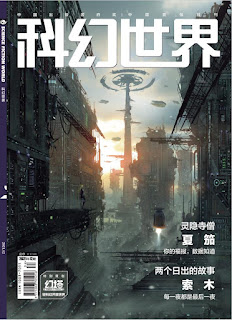Hello science fiction fans attending the 2024 World Science Fiction Convention in Glasgow. First of all, have you heard of Chinese sci-fi fandom? If so, what examples can you give?
 |
| Hugo-winning fanzine Zero Gravity News. |
Science fiction fans in China were excited when Zero Gravity News won the Hugo Award for Best Fanzine last year. See “Introducing Chinese sci-fi fanzine Zero Gravity News” to learn more about the fanzine.
Yes, in fact, there is a very large group of science fiction fans in China, but few people have collected and collated their materials. I have been working on this since 2020, and have written some articles to introduce the collection.
Yes, in fact, there is a very large group of science fiction fans in China, but few people have collected and collated their materials. I have been working on this since 2020, and have written some articles to introduce the collection.
The earliest Chinese Fanzine was born in 1988. In the 1990s, many science fiction fans were employed and writing in their leisure time, but in the 21st century, these contributions were mainly completed by students. Because workers are busy with their lives and families, it is difficult to find time to organize related activities. So I wrote a book, History of Chinese University Science Fiction Association, to introduce Chinese science fiction fans to the rest of the world. The thousands of photos and hundreds of thousands of words are enough to prove the rich history of this group.
The Chinese Science Fiction Fan Association organizes articles, comments and other activities, runs its own Fanzine (I have more than 200 kinds of statistics about this history), and initiates fan organizations (I have more than 350 records of the establishment of student groups and more than 200 social meeting groups). But like most organizations around the world, these organizations have a short life span, and although there are a lot of them, few are longstanding, which I will describe in several subsequent articles.
The magazine you are seeing now is machine translated from the 10th issue of Zero Gravity Newspaper, which includes many young Chinese science fiction fans’ review and understanding of their science fiction experience. How do Chinese science fiction fans discover and learn about science fiction? What did science fiction bring to them? What did they gain? You can read about it in their memories. Because time is limited, only a small number of articles are included, and they are all machine translated, but this is much better than before, so that Chinese science fiction fans are seen, which is important.
At the same time, I am also doing one thing, which is to collect science fiction information and materials from all over the world, translate them into Chinese, and introduce them to Chinese science fiction fans. After I finished my self-summary of Chinese sci-fi fans, I thought I’d look outside. Chinese scholar Sanfeng said in the first issue of World Science Fiction News, a magazine introducing foreign science fiction information in China, “View the world science fiction and build a science fiction world view”, which I think is very reasonable.
At present, I have found 202 articles from 108 countries and organized Chinese science fiction fans to translate them. Now I can say that every continent in the world has a wealth of science fiction conferences, science fiction works, science fiction organizations, science fiction magazines, etc. Most of the other half of countries and regions are either economically poor or have small populations.
In the context of the history of different countries, different languages and peoples will unite with each other/accept foreign languages for historical reasons. You can see the competition between Turkish and Russian in Central Asia, the prevalence of French and Arabic in some African countries, the exchange of Spanish in Latin American countries, and the anger of Southeast Asian countries over the loss of their own cultural traditions. The Dutch and Belgian languages are common, and the former Yugoslavia regularly hosts science fiction conventions to unite fans from several other countries.
The world science fiction center is probably found currently in the United Kingdom and the United States, since so many works are translated into English. Almost all science fiction writers in continental countries are seeking the English publication of their works, eager to be seen by the British and American world and incorporated into the mainstream discourse system.
The question of whether the world’s science fiction center will shift will take a long time to answer, but at this stage, the relationship between English-speaking science fiction and non-English-speaking science fiction is like the relationship between mainstream literature and genre literature, and genre literature is to be absorbed by mainstream literature, and that is the situation. That doesn’t change just because you have a World Science Fiction Convention (which is essentially a gathering of science fiction fans, right?). At best, it gives the authorities some reason to bring together science fiction institutions and science fiction awards that were originally scattered around the world to promote dialogue and cooperation.
In this world, there are many people engaged in science fiction organizations, science fiction conferences, science fiction publishing, science fiction translation, and science fiction research, including in languages other than those that are dominant. But in most cases, unless there is a British-American nationality/an international speaker of English who has connections in the United Kingdom and the United States, it is possible to use their status to make a voice for their own country.
However, after the relevant people step down, the situation may turn to another way, as the old saying goes, maybe this is how the world works, but if each person can leave something in his term of office, I think it will definitely be more and more rich. It should be said that the internationalization of science fiction in non-English speaking countries is currently dominated by established international communicators of British and American English.
The transfer of power over discourse is a long process, which requires writers with enough strength, readers and communities with enough interest, theorists with enough power to subvert the current system, and science fiction activities for writers, readers and scholars to communicate with each other. None of these things is easy.
It’s just that there’s a chain of disdain that seems to be happening all over the world, first of all defining science fiction as a type of children’s literature, and then defining science fiction as secondary literature, so reading a recent comment from a Nepalese science fiction reader on a collection of their own science fiction, it’s not children’s literature, it’s science fiction, I think this kind of reflection is very good. When can science fiction literature really stand up and no longer be subject to contempt, but can be regarded as both adult literature and children’s literature.
Anyway, I hope that Chinese science fiction fans can be more united, but also hope that the world science fiction fans can be more united, there are really many people in the world who agree with science fiction, I hope that we can keep in touch, find each other, in the process of viewing the world science fiction to establish their own science fiction world view.
Have fun in Glasgow!
The Chinese Science Fiction Fan Association organizes articles, comments and other activities, runs its own Fanzine (I have more than 200 kinds of statistics about this history), and initiates fan organizations (I have more than 350 records of the establishment of student groups and more than 200 social meeting groups). But like most organizations around the world, these organizations have a short life span, and although there are a lot of them, few are longstanding, which I will describe in several subsequent articles.
The magazine you are seeing now is machine translated from the 10th issue of Zero Gravity Newspaper, which includes many young Chinese science fiction fans’ review and understanding of their science fiction experience. How do Chinese science fiction fans discover and learn about science fiction? What did science fiction bring to them? What did they gain? You can read about it in their memories. Because time is limited, only a small number of articles are included, and they are all machine translated, but this is much better than before, so that Chinese science fiction fans are seen, which is important.
At the same time, I am also doing one thing, which is to collect science fiction information and materials from all over the world, translate them into Chinese, and introduce them to Chinese science fiction fans. After I finished my self-summary of Chinese sci-fi fans, I thought I’d look outside. Chinese scholar Sanfeng said in the first issue of World Science Fiction News, a magazine introducing foreign science fiction information in China, “View the world science fiction and build a science fiction world view”, which I think is very reasonable.
At present, I have found 202 articles from 108 countries and organized Chinese science fiction fans to translate them. Now I can say that every continent in the world has a wealth of science fiction conferences, science fiction works, science fiction organizations, science fiction magazines, etc. Most of the other half of countries and regions are either economically poor or have small populations.
In the context of the history of different countries, different languages and peoples will unite with each other/accept foreign languages for historical reasons. You can see the competition between Turkish and Russian in Central Asia, the prevalence of French and Arabic in some African countries, the exchange of Spanish in Latin American countries, and the anger of Southeast Asian countries over the loss of their own cultural traditions. The Dutch and Belgian languages are common, and the former Yugoslavia regularly hosts science fiction conventions to unite fans from several other countries.
The world science fiction center is probably found currently in the United Kingdom and the United States, since so many works are translated into English. Almost all science fiction writers in continental countries are seeking the English publication of their works, eager to be seen by the British and American world and incorporated into the mainstream discourse system.
The question of whether the world’s science fiction center will shift will take a long time to answer, but at this stage, the relationship between English-speaking science fiction and non-English-speaking science fiction is like the relationship between mainstream literature and genre literature, and genre literature is to be absorbed by mainstream literature, and that is the situation. That doesn’t change just because you have a World Science Fiction Convention (which is essentially a gathering of science fiction fans, right?). At best, it gives the authorities some reason to bring together science fiction institutions and science fiction awards that were originally scattered around the world to promote dialogue and cooperation.
In this world, there are many people engaged in science fiction organizations, science fiction conferences, science fiction publishing, science fiction translation, and science fiction research, including in languages other than those that are dominant. But in most cases, unless there is a British-American nationality/an international speaker of English who has connections in the United Kingdom and the United States, it is possible to use their status to make a voice for their own country.
However, after the relevant people step down, the situation may turn to another way, as the old saying goes, maybe this is how the world works, but if each person can leave something in his term of office, I think it will definitely be more and more rich. It should be said that the internationalization of science fiction in non-English speaking countries is currently dominated by established international communicators of British and American English.
The transfer of power over discourse is a long process, which requires writers with enough strength, readers and communities with enough interest, theorists with enough power to subvert the current system, and science fiction activities for writers, readers and scholars to communicate with each other. None of these things is easy.
It’s just that there’s a chain of disdain that seems to be happening all over the world, first of all defining science fiction as a type of children’s literature, and then defining science fiction as secondary literature, so reading a recent comment from a Nepalese science fiction reader on a collection of their own science fiction, it’s not children’s literature, it’s science fiction, I think this kind of reflection is very good. When can science fiction literature really stand up and no longer be subject to contempt, but can be regarded as both adult literature and children’s literature.
Anyway, I hope that Chinese science fiction fans can be more united, but also hope that the world science fiction fans can be more united, there are really many people in the world who agree with science fiction, I hope that we can keep in touch, find each other, in the process of viewing the world science fiction to establish their own science fiction world view.
Have fun in Glasgow!









